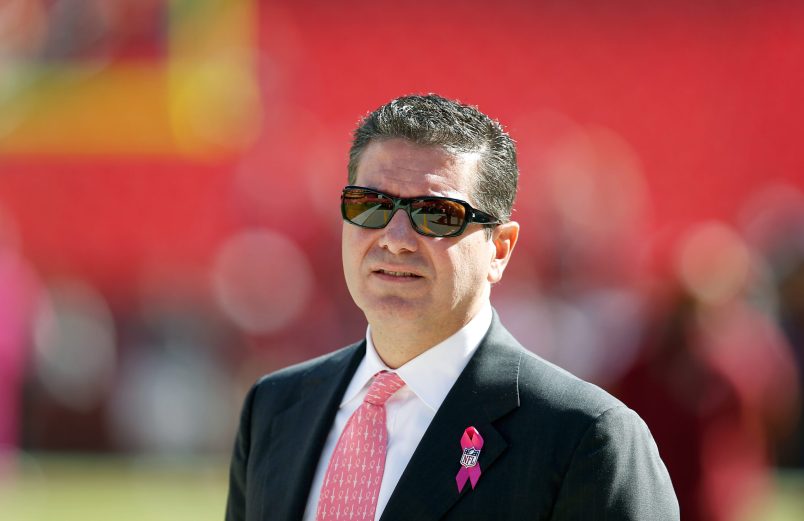An arm of the federal government on Wednesday declared that the Washington Redskins’ name is “disparaging” to Native Americans. That’s not nothing. But as a practical matter, the United States Patent and Trademark Office’s cancellation of six of the Redskins’ trademark registrations will change very little for the pro football team.
Just hours after the release of the patent office’s ruling, the Redskins vowed to appeal, a process that intellectual property law professors say could take years to complete. In the meantime, as the team said Wednesday, the trademark registrations will remain in place.
“[T]oday’s ruling will have no effect at all on the team’s ownership of and right to use the Redskins name and logo,” Bob Raskopf, the team’s trademark attorney, said in a statement.
For one thing, the patent office’s ruling doesn’t make it open season for counterfeiters, as some media reports have suggested.
“It’s definitely not the case that people can go out now and just start printing Redskins shirts, if they wanted to,” Barton Beebe, the John M. Desmarais professor of intellectual property law at New York University Law School, told TPM on Wednesday.
And if the multi-year court battle plays out and winds up getting decided in favor of the five Native Americans who brought the case, and the trademark registrations are actually canceled, even then the effects wouldn’t necessarily be obvious to the casual NFL fan. Because canceling the trademark registration isn’t the same thing as canceling the trademark.
“The practical effects of canceling the trademark registration are subtle,” Christopher Sprigman, a fellow professor of Beebe’s at NYU Law School, said in a separate interview. “Trademarks are not created, at least in the American system, through registration. They’re created by first use of a mark in commerce on some product or service…. Registration just confers some benefits.”
For example, Sprigman said, federal criminal enforcement against counterfeiting is available only when the counterfeiter has used a registered mark. No registration, no criminal enforcement. And yet civil enforcement of the trademark is still available, and would be “more or less” unaffected by the registration cancellation, Sprigman said.
Perhaps more importantly, the Redskins have been here before. In 1999, the patent office’s Trademark Trial and Appeal Board ruled in a similar case brought by a group of Native Americans, and said that the team’s trademarks were disparaging. The Redskin’s appealed in federal court, and a long fight at both the district and appellate level ended in 2009 with the Redskins able to keep their registrations. The outcome of the previous case doesn’t exactly bode well for the current group of litigants, including Amanda Blackhorse, who originally brought their case in 2006.
“The fact is that, for the Blackhorse litigants, the actual evidentiary record in this case is not that strong, as the dissenting opinion [in the patent office’s ruling] pointed out,” Beebe said in an email to TPM. “Because of a quirk in federal trademark law, we’re concerned with whether the marks were disparaging at the times of registration, which were 1967, 1974, 1978, and 1990. How do you go back in time to show that by a preponderance of the evidence? It’s not easy, especially if a previous district court has already ruled that the evidence wasn’t sufficient.”
Beebe said that the “biggest issue” in his mind is that the current group of litigants relied “almost entirely” on the record left by the previous case brought against the Redskins. That’s what prompted Raskopf, the Redskins’ lawyer, to say in his statement that the team had “seen this story before” and expected “the same ultimate outcome here.”
But Sprigman, for one, thought that things could end differently this time around.
“I have a hard time imagining a court explaining to the American people in 2014 how this isn’t disparaging,” he said, later adding: “I think over time [the Redskins are] going to pay a price, they’re going to pay a huge price, in public opinion.”







Personally, I want them to change the name to the Washington Rednecks…just to see how quickly Hannity, O’Reilly and FOXnutz’ News have a collective hate-gasm . Sweet sh*ts & giggles a plenty!
I can understand the anger over the Redskins’ name and logo. But why does the Cleveland Indians’ mascot continue to fly (comparatively) under the radar? If there were an anti-Native American equivalent of Der Sturmer, it would have created Chief Wahoo.
On “At Midnight” last night, a suggested new name was the “Washington Red Shirts”, and you replace the Indian with a Star Trek Classic logo. That would work, given how badly the 'skins have been killed by the competition over the last 10 years or so…
I didn’t think I was hoping for a death blow. I was hoping for the owner to join the 21’st century voluntarily. But sports franchises have an economics all their own: more rich man’s plaything than standalone business. Dude’s indignant backlash against common courtesy, apparently means more to him than the lawyers’ fees he’s wasting or the 100,000 new jerseys he could be selling.
The biggest challenge in today’s Washington DC, is coming up with a distinctive, non-disparaging replacement name. Washington Lobbyists? No. Grifters, Parasites, Hypocrites, Gasbags, Derelicts, Reprobates, “Leaders” in scare quotes? No.
The best I can come up with is the Washington Monuments. They could all run around with little obelisks on their helmets.